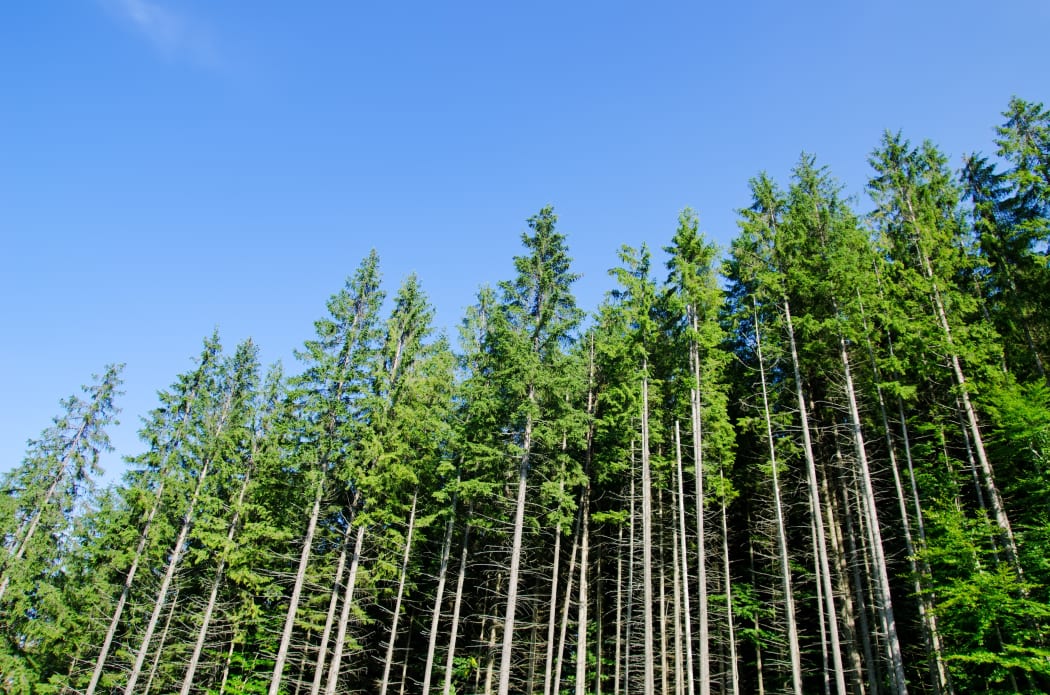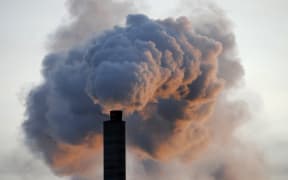More and more of Wairarapa's rolling green pastures are being blanket-planted with pine trees, which rural communities warn are killing their way of life.

Pine plantations have been replacing farmland in Wairarapa, Scott Somerville said. Photo: 123RF
And with the government's target of planting 1 billion trees by 2028 and the uncertainty over the Zero Carbon Bill, farmers say the rest of the country should be worried.
Pongaroa School, nestled in the heartland of rural Wairarapa, is a little country school that is getting even smaller.
The chairman of the board of trustees, Scott Somerville, blamed it on the number of pine plantations which have replaced farmland.
"Those farms might have supported two or three families, those families then move off to other areas.
"How that manifests at a school level is our roll is dropping dramatically, that's not something we are seeing in the future, that's something we are seeing right now," Mr Somerville said.
Farmers are currently excluded from the Emissions Trading Scheme - but many fear this will not be the case for much longer.
They are worried the government's Zero Carbon Bill will mean more taxes for them and threaten their livelihoods.
At a meeting in Carterton last week with the National Party leader Simon Bridges, they voiced their frustrations.
Local farmer Derek Daniell spoke at the event and said the government is shafting New Zealand's main export and destroying a way of life.
"I would describe big areas of pine trees as dead, they are dead areas. People don't live in them, they've just gone out of the system so to speak. Where as farmed areas are places where people live," Mr Daniell said.
Another farmer, James Cates, said once land was converted to pine trees, it was no longer good for farming.
"I don't think the general public is aware of the implications of, I think it's 5 million hectares of pine trees, what it's going to look like in 40, 60, 100 years time because it will not be harvested under this deal, it's a waste of land and it's good for nothing after that," Mr Cates said.
Mr Bridges told the crowd they were right to be worried.
"The truth is, you go too far too fast, and what happens is you just pile on the cost, you'll see industry leave New Zealand, and poor old New Zealand is going to suffer the most," Mr Bridges said.
However, New Zealand Forestry Association president Peter Weir said farmers were focusing on the wrong problem.
"I'd suggest farmers concern should be about climate change and how they are going to address growth in green house gas emissions from pastoral farming, and farmers themselves, planting some of their land in forestry is one very practical option farmers can do to offset their own emissions," Mr Weir said
Beef and sheep farmer Mike Buttrick said politicians were not planning for the future of the rural sector.
"Beef and Lamb New Zealand have got stats that show that seven jobs created via a farm are equivalent to one job in forestry, and that's cool, and that's actually if they even harvest the trees because now we've got permanent forest sink initiatives, where they may not even harvest the trees, so that one job, seven jobs are replaced with no jobs," Mr Buttrick said.
Peter Weir from the Forestry Association admitted there will be fewer jobs initially.
"But once we get into the roading and harvesting phase and get into a continuous cycle of forestry, there are just as many jobs generated and the jobs will pay about twice as much as farming jobs," he said.
The Zero Carbon Bill, which will establish an independent Climate Change Commission with the power to set emissions targets for New Zealand, is due to be introduced to Parliament in the next couple of months.





